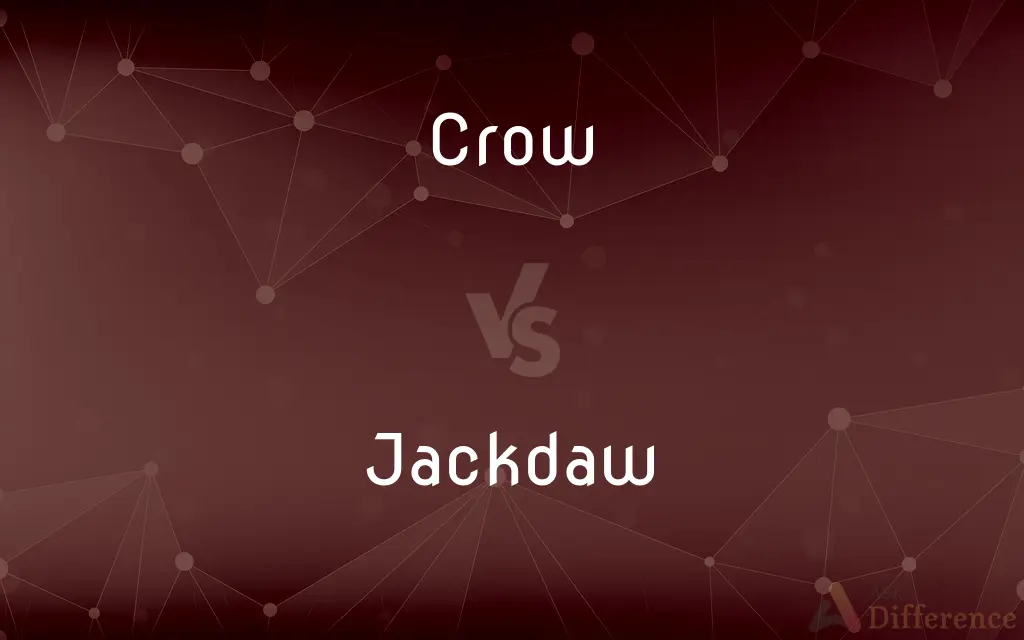Crow vs. Jackdaw — What's the Difference?
By Urooj Arif & Fiza Rafique — Updated on March 14, 2024
A crow is a large, black bird known for its intelligence, while a jackdaw is a smaller, social bird with distinctive grey plumage and a black head.

Difference Between Crow and Jackdaw
Table of Contents
ADVERTISEMENT
Key Differences
Crows are part of the Corvus genus, which includes a variety of large, intelligent birds characterized by their all-black feathers, complex social structures, and adaptability. Jackdaws, on the other hand, are a specific species within the same genus (Corvus monedula) and are notable for their smaller size, grey neck and underparts, and a distinctive silvery sheen to the back of their heads.
While crows are known for their remarkable problem-solving abilities and use of tools, which have been widely studied and documented, jackdaws also display intelligence but are particularly recognized for their strong social bonds and communication skills, often nesting in colonies and engaging in intricate social interactions.
Crows are adaptable and can be found in a wide range of environments across the globe, from rural to urban areas, demonstrating remarkable versatility in their diets and nesting habits. Jackdaws, though also adaptable, are more common in Europe and parts of Asia and prefer habitats that offer cavities for nesting, such as woodland edges, cliffs, and human-made structures.
In terms of vocalizations, crows are known for their loud, harsh "caw" sounds, which serve various communication purposes. Jackdaws, while they also produce a range of sounds, are distinguished by their high-pitched, metallic "chack" calls, which are often heard in their social groups.
Crows, due to their larger size and broader distribution, have a significant presence in folklore and mythology, often associated with mystery and intelligence. Jackdaws, with their distinctive appearance and social nature, have their own place in cultural narratives but are less prominent in global mythologies compared to crows.
ADVERTISEMENT
Comparison Chart
Species
Part of the Corvus genus
Corvus monedula (within Corvus genus)
Size & Appearance
Larger, all-black plumage
Smaller, grey neck, silvery head
Intelligence
High, known for problem-solving
Socially intelligent, strong bonds
Habitat
Wide range, global distribution
Europe, Asia, prefers cavities for nesting
Vocalizations
Loud "caw" sounds
High-pitched "chack" calls
Cultural Significance
Prominent in folklore, symbolizes mystery
Less prominent, noted for social nature
Compare with Definitions
Crow
Known for complex behaviors.
Crows use tools to obtain food.
Jackdaw
Smaller size with distinctive markings.
Jackdaws have a striking grey neck.
Crow
Adaptable to diverse environments.
Crows thrive in both urban and wild areas.
Jackdaw
Prefers specific nesting sites.
Jackdaws often nest in chimneys and ruins.
Crow
Intelligent problem solvers.
Crows can solve multi-step puzzles.
Jackdaw
Social and communicative.
Jackdaws form tight-knit colonies.
Crow
All-black feathers are characteristic.
The American crow is entirely black.
Jackdaw
Recognized by their "chack" call.
Jackdaw calls can be heard in social groups.
Crow
Significant in mythology.
Crows are often seen as omens or messengers.
Jackdaw
Present in European folklore.
Jackdaws are associated with curiosity and playfulness.
Crow
A crow is a bird of the genus Corvus, or more broadly a synonym for all of Corvus.
Jackdaw
Either of two small corvids (Corvus monedula or C. dauricus) of Eurasia and North Africa, having black and gray or black and white plumage.
Crow
A large perching bird with mostly glossy black plumage, a heavy bill, and a raucous voice.
Jackdaw
A European bird (Coloeus monedula) of the crow family, often nesting in church towers and ruins.
Crow
An old or ugly woman
To my two sons I am still just the old crow
Jackdaw
A Daurian jackdaw, a closely related Asian bird (Coloeus dauuricus).
Crow
The cry of a cock.
Jackdaw
Common black-and-gray Eurasian bird noted for thievery
Crow
A sound made by a person expressing great pride or triumph
She gave a little crow of triumph
Crow
Relating to the Crow or their language.
Crow
(of a cock) utter its characteristic loud cry
She was awakened in the mornings by cocks crowing
Crow
(of a person) express great pride or triumph, especially in a tone of gloating satisfaction
Avoid crowing about your success
Ruby crowed with delight
‘I knew you 'd be back,’ she crowed
Crow
A member of a Native American people formerly inhabiting an area of the northern Great Plains between the Platte and Yellowstone Rivers, now located in southeast Montana. The Crow became nomadic buffalo hunters after migrating west from the Missouri River in North Dakota in the 18th century.
Crow
The Siouan language of the Crow.
Crow
Any of several large glossy black birds of the genus Corvus, having a characteristic raucous call, especially C. brachyrhynchos of North America.
Crow
A crowbar.
Crow
See Corvus.
Crow
To utter the shrill cry characteristic of a rooster.
Crow
To exult over an accomplishment or piece of good fortune; boast. ]
Crow
A bird, usually black, of the genus Corvus, having a strong conical beak, with projecting bristles; it has a harsh, croaking call.
Crow
Any of various dark-coloured nymphalid butterflies of the genus Euploea.
Crow
A bar of iron with a beak, crook or claw; a bar of iron used as a lever; a crowbar.
Crow
(historical) A gangplank (corvus) used by the Ancient Roman navy to board enemy ships.
Crow
(among butchers) The mesentery of an animal.
Crow
(derogatory) An ill-tempered and obstinate woman, or one who otherwise has features resembling the bird; a harpy.
Crow
A black person.
Crow
The emblem of an eagle, a sign of military rank.
Crow
The cry of the bird known in the US as a rooster and in British English as a cockerel.
Crow
(intransitive) To make the shrill sound characteristic of a rooster; to make a sound in this manner, either in gaiety, joy, pleasure, or defiance.
Crow
(intransitive) To shout in exultation or defiance; to brag.
He’s been crowing all day about winning the game of cards.
Crow
To test the reed of a double reed instrument by placing the reed alone in the mouth and blowing it.
Crow
To make the shrill sound characteristic of a cock, either in joy, gayety, or defiance.
The morning cock crew loud.
Crow
To shout in exultation or defiance; to brag.
Crow
To utter a sound expressive of joy or pleasure.
The sweetest little maid,That ever crowed for kisses.
Sennacherib crowing over poor Jerusalem.
Crow
A bird, usually black, of the genus Corvus, having a strong conical beak, with projecting bristles. It has a harsh, croaking note. See Caw.
Crow
A bar of iron with a beak, crook, or claw; a bar of iron used as a lever; a crowbar.
Get me an iron crow, and bring it straightUnto my cell.
Crow
The mesentery of a beast; - so called by butchers.
Crow
Black birds having a raucous call
Crow
The cry of a cock (or an imitation of it)
Crow
A member of the Siouan people formerly living in eastern Montana
Crow
A small quadrilateral constellation in the southern hemisphere near Virgo
Crow
An instance of boastful talk;
His brag is worse than his fight
Whenever he won we were exposed to his gasconade
Crow
A Siouan language spoken by the Crow people
Crow
Dwell on with satisfaction
Crow
Express pleasure verbally;
She crowed with joy
Crow
Utter shrill sounds;
The cocks crowed all morning
Common Curiosities
Are jackdaws as adaptable as crows?
Jackdaws are adaptable but have more specific nesting preferences, making them less ubiquitous than crows, which can thrive in a wider range of environments.
Do crows and jackdaws have similar diets?
Both crows and jackdaws are omnivorous and exhibit flexible feeding behaviors, but their diets may vary based on available food sources in their respective habitats.
Why are crows more prominent in folklore than jackdaws?
Crows have a broader global distribution and a more mysterious, all-black appearance, making them more prominent in various cultural narratives and mythologies.
Can the vocalizations of crows and jackdaws be used to distinguish between them?
Yes, the distinct vocalizations ("caw" for crows and "chack" for jackdaws) can be helpful in distinguishing between the two, especially in areas where both species are present.
What is the social structure like in crow and jackdaw communities?
Crows and jackdaws both have complex social structures; crows may form large flocks, while jackdaws are known for their tight-knit colonies and cooperative behaviors.
Can crows and jackdaws coexist in the same area?
Yes, crows and jackdaws can coexist in the same areas, especially in regions where their habitats overlap, and they may even interact within mixed-species flocks.
How do crows and jackdaws demonstrate intelligence?
Crows demonstrate intelligence through problem-solving and tool use, while jackdaws show their intelligence in social communication and the ability to form strong bonds.
How do crows and jackdaws adapt to urban environments?
Both species exploit food sources and nesting opportunities in urban environments, with jackdaws favoring cavities in buildings and crows utilizing a broader range of urban features.
Are there any conservation concerns for crows or jackdaws?
While both species are currently not considered endangered, habitat destruction and changes due to human activity can impact their populations and conservation status.
How do crows and jackdaws interact with humans?
Both crows and jackdaws can interact with humans, often observed in urban environments. Their adaptable nature allows them to exploit human-modified landscapes for food and nesting.
How can one tell a crow and a jackdaw apart from a distance?
From a distance, size, and general coloration can be clues; crows are larger and entirely black, while jackdaws are smaller with noticeable grey patches.
Can crows and jackdaws be trained or tamed?
Due to their intelligence, both crows and jackdaws can learn and respond to training, but wild birds are usually not suitable for taming and are best appreciated in their natural settings.
Do crows and jackdaws mate for life?
Both crows and jackdaws form strong pair bonds, and many species within the Corvus genus are known to mate for life, exhibiting strong loyalty to their partners.
What role do crows and jackdaws play in their ecosystems?
As omnivores, both crows and jackdaws play significant roles in their ecosystems, including controlling pest populations, scavenging, and seed dispersal.
What measures can be taken to protect crow and jackdaw habitats?
Protecting their habitats involves conserving natural areas, ensuring availability of nesting sites, and mitigating negative impacts of urban development.
Share Your Discovery

Previous Comparison
Fee vs. Charge
Next Comparison
Mall vs. PlazaAuthor Spotlight
Written by
Urooj ArifUrooj is a skilled content writer at Ask Difference, known for her exceptional ability to simplify complex topics into engaging and informative content. With a passion for research and a flair for clear, concise writing, she consistently delivers articles that resonate with our diverse audience.
Co-written by
Fiza RafiqueFiza Rafique is a skilled content writer at AskDifference.com, where she meticulously refines and enhances written pieces. Drawing from her vast editorial expertise, Fiza ensures clarity, accuracy, and precision in every article. Passionate about language, she continually seeks to elevate the quality of content for readers worldwide.
















































